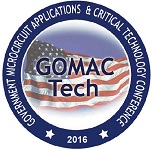The team has done it again! Last year we presented three papers at GOMAC, and this year, we’ll be presenting four! The whole team has put so much effort into this research, and we can’t wait to show off our achievements. GOMAC will be hosted in Miami, so the team hopes to thaw out a bit from winter in addition to giving great presentations on our latest work. Take a look below to learn more about what we’ll discuss. Come out and see us in our first in-person conference in 2 years!
-----
Modernizing FPGA Design Assurance Software
Jonathan Graf, Scott Harper, Ali Asgar Sohanghpurwala, Edward Carlisle IV
Abstract: This paper presents five key principles for modern FPGA design assurance tools: verification, auditing, quantification, automation, and interoperability. We claim these principals are mandatory for such tooling and explore three hardware design assurance software tools in this context – DELV, Trace, and PV-Bit. Our conclusion is that it is possible to create tools that follow the principles and that adherence to these principles quantifiably impacts design assurance.
-----
Advancing Strategy Selection for Hardware Trojan Detection with Subrational Behavior Models
Whitney Batchelor, Meg Winslow, Cody Crofford, Michael Blacconiere, Scott Harper, Jonathan Graf
Abstract: Game theory has been shown to have practical applications in the optimization of hardware Trojan detection and prevention strategy selection in circuit design. In previous work, metrics measuring the performance and cost of a countermeasure when considering the action of an adversary given their goals are quantified to predict optimal defense strategy selections. Those models assume an encounter between two rational players and build upon a security economic approach in the context of empirically derived countermeasure efficacy metrics. That is, both offensive and defensive players act in a rational manner, choosing the action resulting in their greatest financial gain (or lowest loss) when considering the likely action of their opponent. The assumption of rational players allows for a baseline analysis when optimizing detection strategy selection but does not consider human behaviors that may drive a sub-optimal decision. These behaviors may result from having risk adverse/seeking players, carrying bias towards certain methods, understanding the results from prior attacks and defensive mechanisms, and/or additional motivations. In this paper, we extend the rational game theoretic model previously evaluated in the quantitative assurance space with the concept of subrationality; that is, when the players have the option of making an informed but less optimal choice due to some definable bias. This work introduces three subrational models that simulate risk adverse and risk seeking players, knowledge of prior play, and random error with application to the previously developed models pertaining to the optimal selection of hardware Trojan detection strategies.
-----
Trace: Towards a Traceable Microelectronics Implementation Flow
Ali Asgar Sohanghpurwala, Carlton Fraley, Jonathan Graf, Scott Harper
Abstract: Microelectronics design processes often include implementation flows that perform incremental steps to convert human-readable source code or schematics into a binary executable or hardware circuit that can be deployed on the desired Microprocessor, FPGA, PCB, or ASIC technology. Available tools help users partially verify the output of these implementation flows, but a gap exists in assuring and preserving the integrity of those output products along with the source code and implementation settings that were used to produce them. Ideally, a security auditor should be able to prove or disprove the trustworthiness of specific design implementations deployed in the face of an advanced adversary. What is proposed here is progression towards a fully traceable and reproducible implementation flow that uses proven cryptographic principles to enable a tamper-resistant audit trail for Microelectronic design implementation along with companion tools for auditing and precisely reproducing the implementation process.
-----
Automated Analysis of a Thermally Triggered FPGA Hardware Trojan
Edward Carlisle IV, Scott Harper, James Koiner, Kevin Paar, Michael Capone, and Jonathan Graf
Abstract: This paper presents a remote hardware-in-the-loop Hardware Trojan Horse (HTH) analysis approach that automates the process of examining HTH effects and characterizing detection/mitigation effectiveness. We frame the discussion around a novel HTH that is triggered by variations in temperature and is implemented in the fabric of a Field Programmable Gate Array device. We demonstrate the characterization and activation of the HTH using a fully automated web-based lab bench platform.









